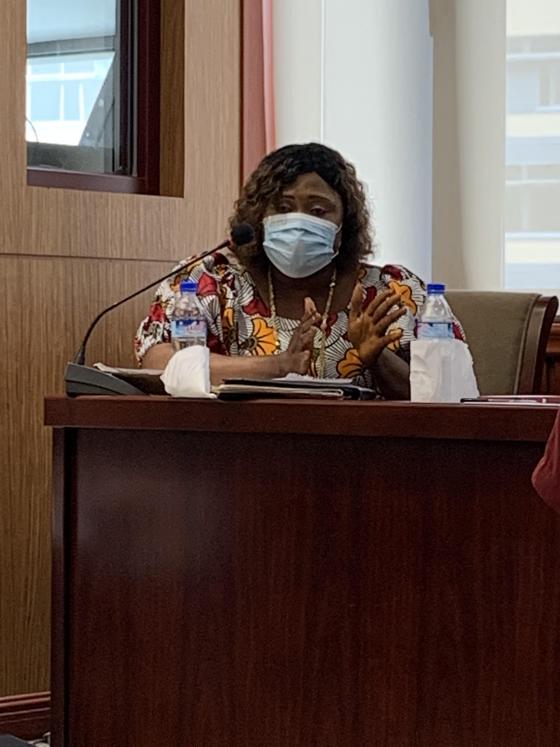No Biometric Voting for 2023

Executive Chairperson National Elections Commission, Madam Davidetta Browne-Lansanah
The Executive Chairperson National Elections Commission, Madam Davidetta Browne-Lansanah, has ruled out the possibility of including the Biometric voting system in the 2023 Presidential and Legislative Elections.
Appearing before the Senate joint committee on Autonomous Commission and Agencies, and Ways, Means, Finance and Budget yesterday, Madam Davidetta Browne-Lansanah disclosed that, as “brilliant” as the presentation by the National Identification Registry (NIR) was, the idea of biometrics in national elections was out of the question for 2023.
“We want to thank the NIR (National Identification Registry) for the brilliant presentation. Notwithstanding, the Elections Commission has always remained open and welcomes the NIR for any discussions; so, Mr. Tiah Nagbe, we are there… We can still talk and see where we can proceed with your recommendations. Notwithstanding, we maintain that the Elections Commission should conduct its own process and then we can support the NIR in the future, but not in the 2023 Presidential and Legislative Elections.”
The issue of the biometric voting system comes amid unresolved issues of electoral data tampering, dating back to the vehemently disputed presidential and legislative 2017 elections. Following the first round of the presidential election that year, several political parties jointly filed a legal action against the National Elections Commission citing fraud during the process, especially regarding the National Voters Roll. The Supreme Court, however, ruled that though instances of fraud were evident, they were not egregious enough to warrant a recount or a rerun of the vote.
According to the Institute for Democracy and Electoral Assistance (IDEA), biometric voter registration (BVR) uses a voter’s physical characteristics, such as facial features or fingerprints, to identify them. “Once a voter is registered with their set of biometric data, their unique template can be stored in different ways. For instance, it can be added, in print or electronically, to a voter ID card. With a comprehensive set of data, a biometric voter register can further cross-check collected templates to efficiently detect and delete duplicate registrants,” the organization says.
IDEA adds that biometric voter registration systems can also verify the identities of voters at the polls on voting day and protect the process against duplication of voter records and double voting.
The Executive Director of the NIR, J. Tiah Nagbe, whose entity made a PowerPoint presentation at the hearing, thanked the committee but expressed frustration for not coming across the opportunity to make his entity’s case the way he did.
“There are now many countries around the world who do elections for US$5.00 per vote or below,” Nagbe said. “We need to ask them how they do it and learn from them. Regarding the way forward, my pleasure and joy is that I have had the opportunity to do this to make the case; my father used to tell me that you don’t argue against the future; if I tell you that it will rain tonight and you say it will not rain, there is no need for debate on that, because we will find out what will happen tonight. The decisions we make regarding this process will manifest themselves and, as a citizen, once I was given my chance to say my piece I’m done, and when it manifests itself that I am right or wrong, that’s left with posterity.”
‘99.9% of by-elections funds received’
Meanwhile, Madam Lansanah informed the Senate that her commission has received about 99.9 percent of the amount of US$1.7 million needed to conduct four by-elections.
At the hearing, she disclosed that, based on the commitment made by the Minister of Finance and Development Planning, the Commission has received funding for by-elections in Bomi, Nimba and Grand Gedeh Counties; but noted that final modalities are almost complete with regard to the Bong County by-election.
Confirming Chairperson Lansanah’s statement, Finance Minister Samuel Tweah, who was also present at the hearing in the Chambers of the Senate, asserted, “For the by-elections, the Ministry of Finance has made available the money.”
The Minister’s intervention became necessary when Madam Lansanah told the hearing that the Ministry of Finance had made some commitment, “And we have received 99.9 percent, and we have written the Speaker of the House of Representatives reminding him about the date for the conduct of the by-elections; that’s where we are.”
The four by-elections became necessary after Representatives Edwin Melvin Snowe, Prince Moye, Jeremiah Koung and Zoe Emmanuel Pennue of Bomi, Bong, Nimba and Grand Gedeh Counties, won their respective counties in the December 2020 Special Senatorial Elections.
